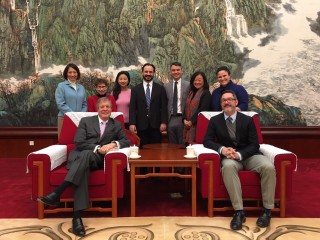Title

Front: President Joseph W. Polisi and Christopher Mossey, senior managing director, Juilliard Global Ventures. Back: Hong Mautz, China advisor; Jane Gottlieb; alumna Chenxin Xu; José Garcia-León; Benjamin Sosland; Myung Kang-Huneke, deputy general counsel; and Gena Chavez, managing director of the Tianjin Juilliard School.
In early January, a hearty crew of Juilliard administrators went to Beijing, Tianjin, and Shanghai, China, to check out and take part in the preparations for the new Juilliard branch that’s scheduled to open in the city of Tianjin in the fall of 2018. Some had been there before, others had not, and a few of the travelers wrote about their impressions.
Body
Ever the diligent librarian, I wanted to be prepared for my first trip to China, starting with the 13-hour flight. It turned out to be more difficult than I anticipated to follow anti-jet-lag advice about sleeping on the plane given the excitement I felt about this trip. The purpose of our visit was to engage in further discussions with our partners on the project and to understand more about academic and curricular matters as we plan for the school’s opening. I was particularly interested in seeing the libraries at the Chinese conservatories that we visited: Central Conservatory in Beijing, Tianjin Conservatory of Music, and Shanghai Conservatory. Each boasted a rather impressive collection of scores and books (with Chinese books shelved separately from English-language books), as well as modern online catalogs and access to selected databases. Materials were shelved in different rooms, sometimes on different floors. Each library also had fascinating rare collections of Chinese music, both scores and recordings. The Shanghai Conservatory, founded in 1927 and the oldest music institution in China, has extensive rare collections of manuscripts from its founders, who had studied at European conservatories.
Our hosts were extremely warm and gracious, and I was pleased to see some colleagues I knew from international library conferences. What struck me overall was the incredible enthusiasm for Juilliard’s project that we encountered every step of the way.—Jane Gottlieb is the vice president for library and information resources.
Finally setting foot in Tianjin after hearing about it for years was a key moment of the trip for me. The Binhai New Area, where Juilliard’s new campus will be built, seems full of possibility: a state-of-the-art city is rising at breakneck speed, complete with a convention center, gleaming high-rises, green space, and a breathtaking train station. (We also happened to see it on a completely smog-free day.) I’m sure it was different three months ago and will be different again three months hence, when even more buildings and amenities are completed. But I think my most vivid memory (and there are many to choose from) is of the audience for a chamber music concert we saw at the Shanghai Symphony Orchestra’s new concert hall. I couldn’t believe how many young children there were! And they were incredibly quiet and attentive. It was a very different demographic than most of us are used to seeing at concerts, and it gave me hope for the future of classical music.—Benjamin Sosland (MM ’03, DMA ’08, voice) is the assistant dean for the Kovner Fellowships and administrative director of Juilliard Historical Performance.
This was a special trip for several reasons. Even though I’ve traveled to Asia before, this was my first visit to China, and I was particularly moved by seeing the site where the first Juilliard branch campus will be built. The energy of the area is infectious; it’s brimming with resources and possibilities. Another key experience was having the opportunity to visit the conservatories where many Juilliard students studied before moving to the U.S. Getting to know their faculties, curricula, challenges, and teaching styles is essential in designing the courses that will be offered at The Tianjin Juilliard School. A welcome byproduct of those visits has been to gain a deeper understanding of the background of Chinese-trained students who are now here in New York.
Ultimately, what made this trip so special was the people involved. There were all the wonderful Juilliard companions, including the gracious Tianjin Juilliard managing director Gena Chavez, who made all our events run seamlessly regardless of last-minute changes, the tireless translators, and the Chinese hosts. Their deep sense of hospitality, generosity, and of course, delicious food—who doesn’t enjoy a fresh xiao-long-bao (Shanghai soup dumpling)?—made us leave longing to soon return for more.—José García-León is the associate dean for academic affairs.








